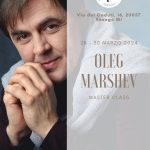http://www.musicweb-international.com/SandH/2008/Jul-Dec08/marshev1707.htm
Whangarei Recital
Oleg Marshev (pf.), Capitaine Bougainville Theatre, Whangarei, New Zealand, 17.7.2008 Brahms – Sonata No. 1, op. 1; Liszt – Spanish Rhapsody; Chopin – Three Waltzes op. 34, Ballade No. 4 op. 52; Scriabin – Two Mazurkas op. 40, Two Poemes op. 32, Vers la Flamme op. 72
The auditorium of the Capitaine Bougainville Theatre admirably fulfils its acoustical design criteria. Although it’s splendid for dramatic productions, an acoustic that’s as dry as dust does tend to drain the life out of “live” music. Fortunately the piano, with its largely self-contained ambience, is relatively impervious to such surroundings. However, this won’t prevent some pianists putting their own murk into the music.
The many recordings of the Azerbaijani pianist Oleg Marshev testify to the needle-sharp clarity of his articulation. Hence, not many pianists, it seems, could be as well qualified to do battle with – or, rather, take advantage of – the theatre’s deliberately desiccated acoustics. Marshev’s programme, counterposing the dense, chord-heavy textures of Brahms against the often fingertip filigree of Chopin, Liszt and Scriabin, met the challenge head-on.
Having become acquainted with Marshev exclusively through his Danacord discography, I was truly drooling over the prospect of, at long last, actually seeing him perform. You see, for years I’d been waiting in vain for him to appear somewhere in my native Yorkshire. If you’re thinking that travelling 12,000 miles to catch up with him seems a somewhat drastic measure, let me assure you that it was serendipity, pure and simple.
Perhaps even more markedly than Artur Rubenstein, whose performance in Huddersfield many years ago still reverberates in my memory, Marshev moves with the utmost economy. Even at full power, it seems as if his hands lift scarcely more than an inch (2.54 cm.) or so above the keyboard. He sits, disarmingly calmly, observing his hands – in spite of, as it were, being born with a keyboard at his fingertips – as though mildly bemused by their prodigious acrobatics.
Occasionally, just occasionally, at moments of extreme tenderness, he affords himself a brief gaze upward, in the general direction of the tip of the piano lid – and the vista of Heaven beyond. To misquote Stravinsky, Marshev is like a vessel through which the music passes. Firmly believing in “putting the music first”, he simply lets his fingers do the talking. And, by gum, can those fingers talk. [ PSe may live in New Zealand, but he’s originally fron Yorkshire. Ed]
But he’s far from deadpan. Behind the quiet concentration lurks a warm personality. For example, the end of the Brahms’s first movement drew a spontaneous burst of applause, to which Marshev responded, just as spontaneously, with a cheery grin and little wave. He left me in no doubt that, in spite of its textural density, the Brahms Sonata was the work of a lively, clean-shaven youngster, to the extent of his – possibly unwittingly – uncovering a faint pre-echo of Gershwin in the finale’s second theme. Good as his Danacord recording is, here he was palpably less “buttoned”, investing the third movement in particular with an entirely appropriate boisterousness.
Following the portentous opening of Liszt’s Spanish Rhapsody, Marshev dispatched the electrifying Jota with flighty felicity, sparkling and fizzing, climactically “boiling over” like a glass of particularly perky champagne. “Brahms and Liszt”, indeed!
These Chopin Waltzes are essentially delicate, even fragile pieces, not really designed to support the weight that Marshev gave their climaxes. Otherwise, in these and the Ballade (which, at rock bottom, is also a waltz) he brought a lovely, liquid ebb and flow that transcended mere elasticity of tempo. He even teased some gentle humour from the third Waltz.
It was from here on that I gradually became aware of the unfolding of a neat scheme. The first of the Scriabin Mazurkas “followed on” quite naturally from Chopin’s Ballade. So, by first pointing up the stylistic similarities and then choosing a representative sequence of Scriabin items, Marshev demonstrated the evolution of the “mad philosopher’s” unique quality from a Chopin-esque prototype.
Thus ended the programme, engulfed in the flames of Scriabin’s fevered vision, flames that were luridly reflected in the flickering blur of Marshev’s fabulous fingers, flashing ever faster. Needing little encouragement, although he got plenty, Marshev treated us to three encores. An impressionistic babbling brook courtesy of Richard Strauss, some typically pungent Prokofiev, and a frothy Emil von Sauer showpiece furnished the icing for a tasty cake that was both a feast of fun and food for thought.
Paul Serotsky


